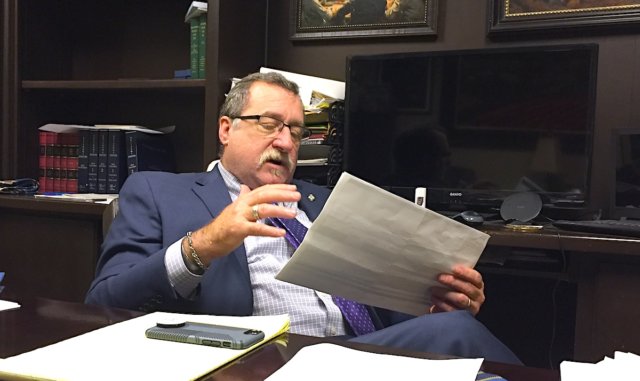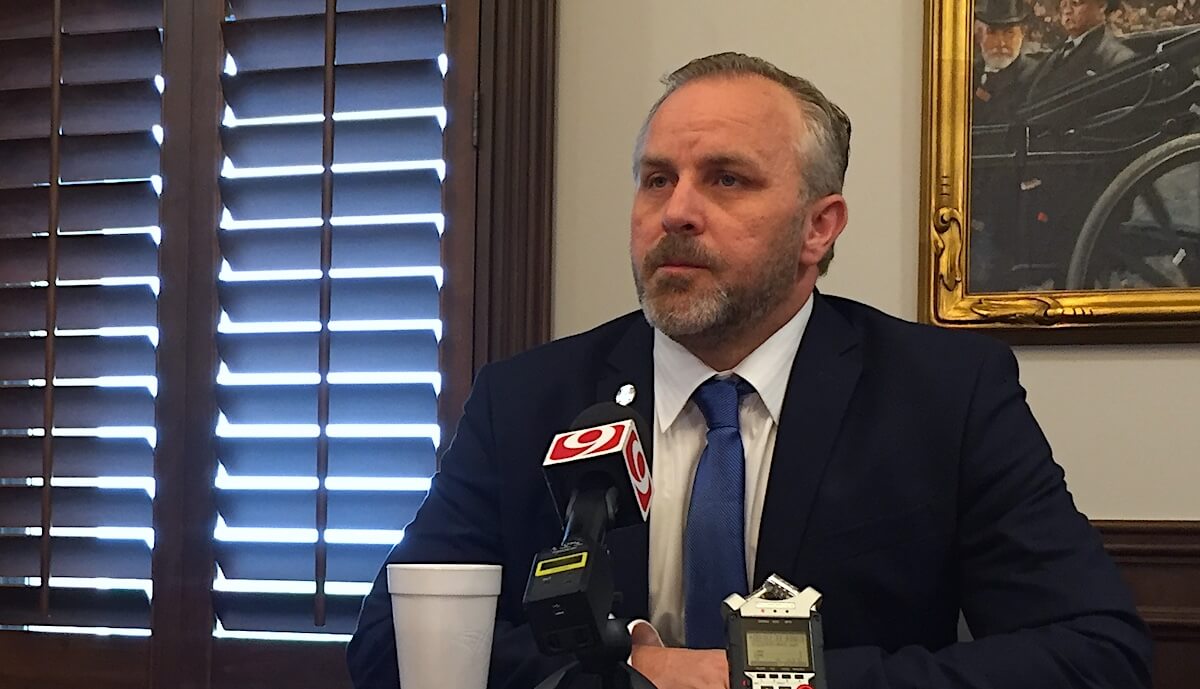

Whether to fund a $1,200 teacher pay raise has been the biggest debate in Oklahoma’s legislative budget negotiations: The House wants a pay raise across-the-board for all teachers, while the Senate would prefer all new dollars go through the state funding formula.
As budget negotiations have progressed, a proposal that would give some district superintendents an option to use those dollars differently has been floated as a potential compromise.
By amending or removing “Section G” from the HB 1780 teacher pay raise language, districts paying teachers more than the statewide mandated minimum salary could choose to use new dollars to add support staff or reduce class sizes by hiring more teachers, among other options.
House Appropriations and Budget Subcommittee Chairman Mark McBride (R-Moore) said he favors mandating the teacher pay raise across the board, but he explained the proposal, which he said originated in the Senate.
“They’d have the choice,” McBride said of local superintendents. “It doesn’t add $1,200 to their base pay. The superintendents would have the choice whether they want to increase the pay or not or put it into whatever else.”
Oklahoma has 512 independent school districts, and 337 of them (or 65.8 percent) currently use the state minimum teacher salary schedule, according to State Department of Education data. The other 175 districts — which pay their teachers more than the state minimum — would have the option to raise teacher pay or invest elsewhere in their schools.
Treat: ‘I don’t wish to negotiate that part in public’

Others who spoke on background about the proposal also said the idea originated in the Senate.
“I don’t wish to negotiate that part in public,” said Senate President Pro Tempore Greg Treat (R-OKC). “There’s some stuff back and forth, and obviously I’ve been very transparent about where that disagreement is, but the particulars of how we solve it I’m not interested in talking about.”
Senate Appropriations and Budget Chairman Roger Thompson (R-Okemah) said he understands that the House thinks senators are pushing for local flexibility by eliminating the across-the-board pay raise mandate. But he said “we’re just not right now.”
“(House Appropriations and Budget) Chairman (Kevin) Wallace and I have had no discussion on Section G at this point. They want across-the-board teacher pay raises, and we’re just not there,” Thompson said. “We’re still at 100 percent (of new dollars being dedicated to the funding formula).”
Treat concurred during his Thursday press conference, saying he has openly discussed the chambers’ different preferences for education each week.
“The Senate is prioritizing funding to the formula and trying to get more money to the classroom — which would allow them to hire more teachers to lower the classroom size — and the House is obviously pushing the $1,200 teacher pay raise,” Treat said. “That’s a huge part of what we need to get done to solve the budget.”
House wants teacher pay near top of region
With that debate on education funding widely discussed in recent weeks, some lawmakers view giving flexibility to districts above what would be the new minimum teacher pay scale a compromise.
“Not for me,” McBride said. “I don’t like it, but you know at the end of the day, I don’t know.”
McBride said he believes the Legislature can deliver an across-the-board teacher pay raise and still provide districts more dollars for new teachers or other initiatives.
“I think we can do the basically $70 million into the formula and do $70 million for the teacher pay raise,” he said. “I think we need to do that because if we don’t do it this year we are going to have to do it next year. So why not do it this year and maybe do some more next year?”
McBride has published that view in a newspaper op-ed, and several other House Republicans have posted recent Oklahoma State School Board Association data to note that a $1,200 across-the-board teacher pay raise would keep Oklahoma near the top of its region. House members have also pointed to Gov. Kevin Stitt’s call for a $1,200 teacher pay raise in his State of the State address.
Asked about negotiations concerning the pay raise bill’s “Section G,” his office declined to elaborate.
“Budget negotiations are ongoing and the governor is not commenting on negotiations at this time,” Deputy Secretary of State Donelle Harder said Thursday.
The governor’s office is still pushing legislative leaders to save up to $200 million of new revenue, multiple people familiar with budget negotiations have said.
Thompson said Senate members want “100 percent” of new common education funding to go through the state’s formula, which distributes dollars to districts based on local property tax revenues and student population.
“Let’s lower the class size, let’s get more teacher aides,” Thompson said. “Give the school boards more opportunity to hire more teachers. So we’re still interested in putting all the money in the classrooms, plus that’s what teachers are asking us to do.”
House Democrats ‘push the majority to fund core services’
House Democrats released their own budget proposal Monday, calling for the $1,200 teacher pay raise, a $1,200 support staff raise, a $10,000 bonus to all National Board Certification teachers and $200 million more into the state funding formula.
The proposal, however, is predicated on a package of raises to the state income tax and the elimination of the capital gains tax exemption, with an agricultural exemption.
“We see any budget as a moral document,” House Minority Leader Emily Virgin (D-Norman) said, adding that her caucus released its proposal “to push the majority to fund core services at the level they’ve promised.”




















